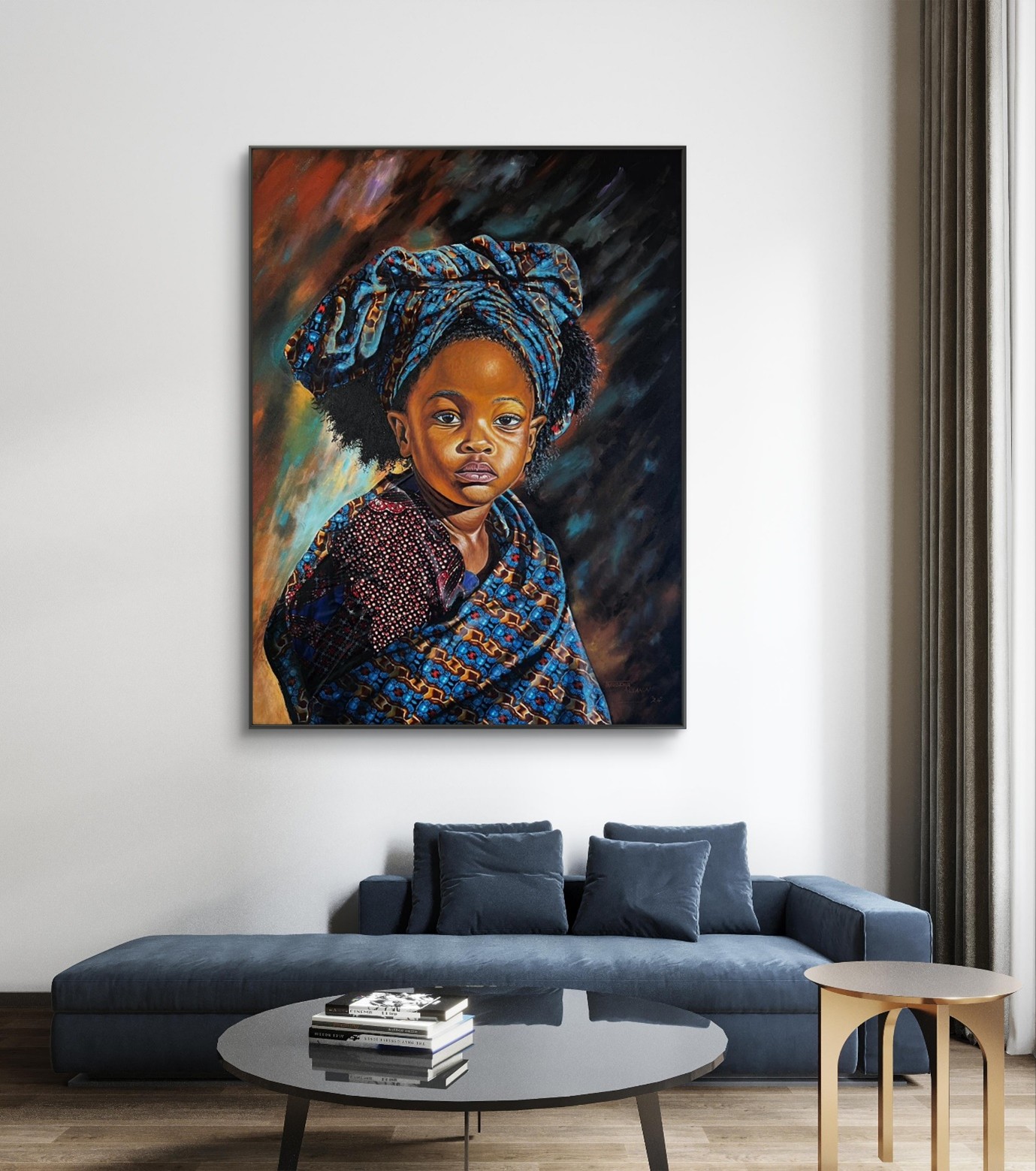A Place called Home :

Madetere
I was 19 when I left home—when I walked out of my father’s house and into the world with more questions than answers. Since then, I’ve never truly settled. I’ve lived like a nomad, crossing borders, drifting through cities, passing through lives. Always searching for something I could never quite name.
They say a house doesn’t make a home, and I’ve come to believe that. A house only becomes a home when it's filled with laughter—when children race through the hallways and a loving wife’s presence softens the silence. Without that, it's just walls and a roof. Furniture doesn’t hold you. Tiles don’t remember your name. It’s people who make a space sacred. Love breathes life into stillness. Else, the idea of “home” becomes—like trying to hold onto mist. Just when you think you’ve grasped it, it slips away.
There have been moments when I almost gave up on the mission to turn my house into a home. In those times, I’d find myself looking back—trying to return to the place I once called home. But somewhere along the way, I realised that the home I left behind no longer exists. That place, that time, that sense of belonging—it’s gone. Frozen in memory, but unreachable in reality.
So I tried to move forward. To build something of my own. To carve out a sanctuary in a world that often feels loud and chaotic. But it’s never been easy to recreate the peace and love I once knew. The warmth of the home I grew up in still lives in me—and I always try hard to recreate it.
Let me tell you about that place.
I was born and raised in Madetere, a vast prairie nestled in the foothills of unnamed mountains in Makoni Central, Eastern Zimbabwe. Not far from my father’s house stood the Kingdom of Mambo Makoni, his royal kraal. Across the strip from that kraal was the King’s field—Zunde, as we call it in my native Shona. And between them lay a small shopping village—the heart of the Kingdom. This is where my brothers and I spent our Christmas holidays with cousins from the big cities, and local friends from school.
I’ve heard stories of people who leave their countries, live abroad for decades, and eventually return “home.” But what about those who never left, yet still feel the need to go back? Where do they go? Are they missing home—or is there something missing within their home?
So I ask: does a place called home truly exist?
Every time I visit a new country, I catch myself wondering: Could I live here? And the more I travel, the more I realise that home is no longer a place. I’ve flirted with so many destinations, surrendered to their beauty, their rhythm, their sweetness. And yet, the emptiness inside me remains. My ignorance of the world is no less shallow than before. I’m still in awe—of its vastness, its diversity, its languages and histories.
And so, I keep searching for a space I can call my own. A place I can belong. And slowly, I’ve come to accept that home is not a location. It’s a feeling. A perception. And that sense of belonging—to a specific region, culture, or people—has long since slipped through my fingers. Perhaps that’s why I keep wandering. Still searching for a place called home.
For some, home is love—a person, a connection, a space where they are truly seen. For others, it’s a religion, a creed, a value system that anchors them. Some find it in purpose, in work, in mastery. And then there are those for whom home is something else entirely—an addiction, an affliction, a sacrifice no one noticed.
But what does that really mean?
It means home isn’t always a place. Sometimes, it’s a memory. A longing. A wound. A dream we spend our lives trying to rebuild, piece by piece. Sometimes, home is not where you were, or where you are—but who you’re becoming in the in-between.
Now, let me take you back to a memory. A journey from my childhood in Madetere. One that has lingered longer than most.
My childhood in Madetere was filled with wild adventures and treasured memories, forever etched in my mind. My brothers and I lived happily in my father’s compound. It was a modest homestead, yet we never lacked food, shelter, or anything a child could wish for. But the memories that stand out are not of comfort, but of adventure. I remember the summers when my brothers and I would travel 21 kilometres on foot to visit our maternal grandmother, deep in the heart of the Kingdom.
My grandmother made the best peanut butter, and my brothers and I would use that as an excuse to escape home. My father, a caring man, did not approve of us wandering aimlessly, so we needed a solid reason for our travels. On those rare occasions when we were granted permission, my eldest brother would lead the way, cutting through thick bushes and crossing waist-high streams until we reached the nearest Growth Point, paNyabadza.
At the time, I was too young and innocent to enter bars, so my brothers would leave me at the entrance while they bought beers. They would return with a soft drink and some lollies for me, making the journey feel less gruelling. But no matter what time we left home, we always arrived at my grandmother’s house after dark. The journey was always a full day’s trek.
Along the way, we passed through many homesteads and vegetable gardens. Occasionally, my brothers would ask for drinking water—especially if they spotted a girl they liked. To be honest, I was either too young or too shy to know if the girl was attractive. But those little stops made the journey more exciting, more bearable. I always looked forward to those hikes with my comrades.
And now, for the first time, I am sharing one of those travel memoirs. My brothers had sworn me to secrecy back then, threatening never to take me along if I spoke of our escapades. But now we are older, our grandmother is gone, and those trips are no longer needed.
My eldest brother stopped at a house to ask for water. He knocked on the rickety wooden door, and a frail voice answered from within, barely rising above a whisper. It was nearly sunset, and we had been walking all day. My brother pushed the door open, but it nearly came off its hinges. Inside, an old woman beckoned us in, directing me to sit on a goatskin rug while my brothers perched on sacks of corn behind the door.
When my brother asked for water, the woman told us her granddaughters had gone to fetch some from the well, so we could wait if we wished. My brothers exchanged knowing glances, perhaps intrigued by the mention of granddaughters. We sat in silence, waiting. The goatskin rug had a faint, musky odour, and I silently wished for the girls to return quickly.
The old woman eventually offered us roasted peanuts. Delighted, we accepted. She then asked my brothers to help her up so she could fetch the peanuts from the Dura, granary. As she struggled to walk, she requested that they thrash the corn in the sacks while she checked on the girls.
And so, my brothers emptied the oversized sacks of corn and set to work, their wide smiles exposing gleaming white teeth in the dimly lit hut. I did not join them—I only watched. Half an hour passed. Then an hour. I asked my eldest brother if we should leave. But he insisted we wait.
Another hour passed. My brothers finished thrashing the corn and decided to check outside. They circled the compound, peering into the huts. No one was there. No one was coming. The footpaths bore no signs of approaching footsteps. Without a word, we exchanged glances and started on our way.
That was the longest journey between my father’s house and my grandmother’s. To this day, I can still smell the goatskin rug, thick with age and memory. My legs still ache at the thought of sitting cross-legged for three hours without flinching, too afraid—or too respectful—to shift. The old woman’s foreboding little hut still haunts my dreams. And yet, my brothers and I have long since stopped asking where she went, or who she really was. Her name, her story, what became of her—all of it has faded into silence, like a song we once knew but can no longer hum.
Somehow, life echoes that experience. We find ourselves waiting—sitting in dark places, thrashing someone else’s corn, clinging to promises of something more. It doesn’t matter how far you’ve come—whether you’re labouring in a land that was never yours, chasing fleeting dreams, or holding out hope for something that may never arrive. Eventually, you realise you don’t belong there. And the thought of home—wherever or whatever that may be—starts calling you back.
Perhaps home is not a place at all, but a story we tell ourselves. A feeling we create. A journey rather than a destination.
I’ve found my way home—in prose. In writing stories about my life, my travels, my memories. This is how I piece it all together.
So, I invite you to walk with me. To remember with me. To keep searching for that one place we all long for: A place called home.


